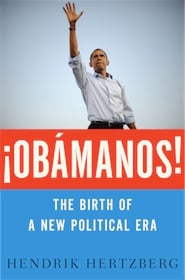A former speechwriter for President Jimmy Carter, Hendrik Hertzberg is the principal political commentator at The New Yorker. He has just published ¡Obámanos!, a collection of short pieces written in the course of the 2008 presidential campaign. I put six questions to Hertzberg about his new book and how things have shaped up since the campaign ended.
1. ¡Obámanos!, you write, came from a sign you spotted during a campaign stop in northern New Mexico. Why did you choose this as the title for your book?

I don’t speak Spanish (though I do know what “¡vámanos!” means), but I never considered another title. This one just popped back into my head the second I saw the line on the contract where title was listed as something like untitled on 2008 campaign.
¡Obámanos! conveys, I hope, the exuberance, the out-of-nowhere unexpectedness, the “let’s go!” of it all. (Those two exclamation points give it a kinetic balance, like a jet-propelled propeller, ready to whirl.) Above all, it suggests the scrambling of identities and ethnicities that Obama personifies and represents. A lot of us have roots, as opposed to just one root. Obama exemplifies a way of being American that hasn’t had much expression at the highest levels of our government—mixed, mongrel, hybrid, Creole. Like American music.
2. In the introduction, you write that the Obama candidacy “presented a once-in-a-generation opportunity to make many previously improbable good things happen at once.” We’re now eight months into the new presidency. Has any of that enthusiasm worn off?
Obama was responding to, and sharing, a yearning for unity, but not with split-the-difference mush. Even in this most unifying passage, the underlying political message is plain: against racism, for civil liberties and gay rights.
As a former speechwriter, I was impressed. But it wasn’t just the words. It was equally the aura of mastery. The only other time I had witnessed a comparable performance at a convention was in 1984, in San Francisco, when Governor Mario Cuomo’s keynote address instantly made him a national figure. Both men took hold of the audience, in the hall and at home, with a preternatural confidence, playing the murmurs and cheers of the crowd like a musical instrument. Both made Democrats, haunted for decades by a phantom of themselves as losers who are weak and glum, suddenly feel like winners who are strong and joyful. Cuomo was grand opera and Obama was the rebirth of the cool, a jazz formalist, but both were virtuosi. Their very names were music.
—From ¡Obámanos!: The Birth of a New Political Era
Reprinted by permission of the publisher, The Penguin Press. Copyright © 2009 Hendrik Hertzberg
Yes, of course. How could it not? A Presidential campaign is a focussed drama that builds, slowly at first but with mounting tension and excitement, toward a single climactic goal. It’s an exercise in hope and yearning. After it’s over, even if it’s successful, a certain post-coital tristesse is inevitable.
In a presidential campaign, the outcome (2000 excepted) is sudden, crystal clear, and final. It’s a zero-sum game. And in 2008, thanks to the awfulness of what went before and the extraordinary attractiveness of the avatar of the hoped-for future, the “sum” part was a shimmering Shangri-la glimpsed on a distant peak.
During a campaign, we all implicitly sign on to a fantasy. The fantasy is that the president is the government, that what he says goes, that he is (or can be) the “commander-in-chief,” the prime mover of the nation and the world. The fantasy is that changing presidents will change everything.
An administration, on the other hand, is an exercise in confronting reality. The president is the head of just one of three separately elected federal “governments,” all of which must agree for anything fundamental to happen, especially on the domestic side. That’s no big problem if your agenda is limited to cutting taxes, starting wars, kowtowing to society’s winners, and punishing society’s losers. But if you want to do something large and positive and disturbing to the status quo, the obstacles are huge.
If you leave out of account the kind of change that requires a supermajority in the Senate, President Obama has already accomplished a great deal. For the rest, the outcome is uncertain, obscured by the smoke of legislative battle. Even at best, though, a presidency like his is bound to fall short of the ecstatic vision of the campaign. Given the realities of America’s fragmented system of governance, Obama is doing very well. My regard for him remains high.
3. A thread that runs through this book is Obama’s rhetorical style, which you present as maturing steadily through the campaign—very impressive from the outset, and yet gaining in power and steadiness as the campaign progressed. That was the candidate Obama. How do you compare this with the rhetorical style of Obama the president?
As a candidate, Obama was cool, calmly analytical, unflappable, reassuring. The emotional energy was provided by the fervor he evoked from the only audience that ultimately counted, namely the voters he touched, who were thrilled to be treated as intelligent, public-spirited adults. The audiences he addresses as president are more varied, more complicated, and more entrenched. A president’s rhetoric is necessarily more “official,” more careful, and more diffuse than a candidate’s, because the context in which he is embedded is so much more complex. Rhetoric remains important, but it constitutes a proportionately smaller part of a president’s toolkit than of a candidate’s. Actions speak louder.
That said, both Obama’s presidential speeches and his unscripted performances at news conferences and the like have been very impressive, and it seems to me that they are “gaining in power and steadiness.” Perhaps I’m wrong, but I seem to detect a calibrated turning up of the emotional intensity, as in his remarks at the memorial ceremony at Fort Hood. That is a good and needed thing.
4. You grill the press over their handling of presidential debates (both coverage and presentation of questions) and their coverage of the campaign generally—especially the style that obsesses over supposed gaffes rather than pressing for more earnest discussion of issues of substance. Was the 2008 election any worse than any of the other elections over the last twenty years in this respect?
Actually, I think it was better. Of course, it helped that Obama was not exactly a gaffe machine, the “clinging to guns and religion” episode—a classic example of Kinsley’s Law of Gaffes—being the main exception. But the press appeared to have learned a little from its mistakes during the previous two cycles. Perhaps there was some residual guilt about the viciousness of the 2000 coverage of Gore’s “sighs” and “lies” and about the free passes issued to W. and his draft-dodger of a running mate. Ditto the press’s complicity in the 2004 swiftboating of John Kerry. In 2008, the Ayers and Wright distractions were handled more responsibly, on the whole. At least that’s how it looks to me in retrospect. I’d probably feel differently if Obama had lost.
5. In addition to Barack Obama, the other “new face” in the 2008 race was Sarah Palin. Notwithstanding increasingly bad polling numbers, Palin seems to have emerged as a real power within a leaner and meaner G.O.P. In New York’s 23rd district, for instance, she is credited with driving the Republican nominee from the race. What do you make of Palin as a political force and how do you see her prospects back on the national stage?
Most of the commentators, again, seemed to get it wrong, mainly because they were grading on a curve. Palin did “better than expected.” On the other hand, she had been expected to do so poorly that she could hardly fail to do better than expected, i.e., that she was expected to do better than expected, which means she did about as well as expected. But according to the insta-polls, the electorate, as opposed to the expectorate, seems to have concluded that Biden “won,” possibly because what the electorate was expecting was a debate between two candidates for vice president, not the raw materials for some arcane calculation of who exceeded whose expectations. Biden succeeded in making a case for the Obama-Biden ticket. Palin succeeded mainly in making a case that she, Palin, is a person of near-normal intelligence and greatly superior adorability.
—From ¡Obámanos!: The Birth of a New Political Era
Reprinted by permission of the publisher, The Penguin Press. Copyright © 2009 Hendrik Hertzberg
Her book tour seems to have overshadowed mine a little, but that’s show business.
Perhaps it’s a failure of imagination on my part, but I cannot believe that a major national party will seriously consider nominating her for President of the United States. But that won’t stop her—and, perhaps more importantly, the angry, ignorant, resentful populist nihilism of which she is the pretty face and which the Beck-Limbaugh-Fox News media nexus inflames every day, around the clock—from holding pretty much the entire Republican party hostage and forcing it into a posture of endless appeasement.
6. William Kristol has written that converting the G.O.P. into a party which is still more conservative and ideological—embracing the “teabaggers,” the “birthers,” the “deathers” and similar groups—will make it stronger in the long run. No doubt such an extreme G.O.P. is good for Kristol. But as a self-described Democrat, what do you make of the current plight of the Republican Party and the plans for a radical makeover?

I have to admit it: notwithstanding the ugliness of the Republican crowds during the 2008 campaign, the fathomless cynicism, dishonesty, irresponsibility, and utter indifference to the welfare of the United States demonstrated in 2009 by the Republican members of the House and Senate has taken me by surprise.
The Republican party’s self-marginalization may be “good” for Democrats in the short term, in that it may slightly reduce the inevitable Republican gains in the 2010 midterms (and a Republican gain is inevitable no matter what), but in 2012 a Republican party in thrall to an unhinged, irresponsible, extreme-right lumpen “base” would present a real danger to the nation and the world, because it will be the one and only alternative to Obama and the Democrats.
If Obama is reelected, as I expect he will be, then perhaps the fever will pass. Perhaps by 2016 the Republicans will have drawn back from the brink of madness. So we must hope, because one day they will be back in power. That is as certain as the coming of winter—more so, actually, given the climate change they are determined to deny.


